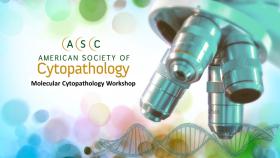
Molecular Cytopathology Workshop
Cytology specimens undergo different preparation techniques from histologic tissue and therefore have unique limitations and applicability. Further, the limited volume nature of cytological specimens require judicious triaging and prioritization of specific molecular tests, based on the tumor type. As such, it is critical for practicing cytopathologists to understand the strengths and limitations of the various testing platforms for our unique specimen types. This course will provide essential skills for trainees and practicing pathologists to gain confidence in various aspects of molecular cytopathology. Through improved training in molecular pathology, cytopathologists can adequately triage specimens to expedite clinically actionable testing and be able to implement changes in their own practice to better utilize cytology specimens for molecular testing.
The course provides organ-specific detailed molecular training, as well as general teaching on molecular assays and test selection. The course will empower cytopathologists to serve as experts in molecular cytopathology for both test selection and results interpretation.
Target Audience
This educational activity is designed for pathologists, fellows/residents, cytotechnologists, and other members of the cytopathology community.
Learning Objectives
- Build confidence in molecular test ordering and interpretation
- Understand the cytology specimen types available for molecular testing
- Review common testing methodologies
- Understand organ-specific testing recommendations and limitations
Course Directors:
Vivian Weiss, MD, PhD
Vanderbilt University Medical Center, Nashville, Tennessee
Sinchita Roy-Chowdhuri, MD, PhD
The University of Texas MD Anderson Cancer Center, Houston, Texas
| Faculty | Session |
|---|---|
| Maria D. Lozano, MD, PhD, MIAC | Cytology Tissues and Pre-Analytic Processing for Molecular Testing |
| Sinchita Roy-Chowdhuri, MD, PhD | Choosing the Right Molecular Assay |
| Giancarlo Troncone, MD | Basic Molecular Testing Methodologies |
| Paul VanderLaan, MD, PhD | Lung Molecular Testing |
| Michiya Nishino, MD, PhD | Molecular Diagnostics in Thyroid Cytology |
| Michael J. Thrall, MD | Molecular Testing in Gynecologic Cytology |
| Aatur D. Singhi, MD, PhD | Clinically Relevant Genomics of the Pancreatobiliary Tract: What Cytopathologists Need to Know |
| Esther Diana Rossi, MD | Salivary Gland Molecular Testing |
| Vicki Jo, MD | Integration of Molecular Testing in the Cytologic Diagnosis of Soft Tissue Tumors |
| Chris VandenBussche, MD, PhD | Molecular Testing in Exfoliative Cytology |
| Chris VandenBussche, MD, PhD | Molecular Testing in Urinary Cytology |
| Vivian Weiss, MD, PhD | Molecular Testing Interpretation and Diagnostic Reporting |
Planners Disclosures
Current ACCME guidelines state that participants in CME activities should be made aware of any affiliation or financial interest that may affect the speaker’s presentation(s). Therefore, it is the policy of the ASC to insure balance, independence, objectivity, and scientific rigor in all its educational programs. All planning individuals participating in any ASC Educational Activity are expected to disclose to the program audience any real or apparent conflict(s) of interest that may have a direct bearing on the subject matter of the continuing education program. Click here for a complete list of planners.
Faculty Disclosures
| Faculty | Disclosure |
|---|---|
| Maria D. Lozano, MD, PhD, MIAC | Speaker: Roche, Pfizer, Astra Zeneca |
| Sinchita Roy-Chowdhuri, MD, PhD | None |
| Giancarlo Troncone, MD | Advisor: Ely Lilly, Bristol Myers Squibb, GlaxoSmithKline |
| Paul VanderLaan, MD, PhD | Consultant: Gala Therapeutics, Intuitive Surgical, Galvanize Therapeutics |
| Michiya Nishino, MD, PhD | None |
| Michael J. Thrall, MD | None |
| Aatur D. Singhi, MD, PhD | Honorarium: Foundation Medicine |
| Ester Rossi, MD | None |
| Vicki Jo, MD | None |
| Chris VandenBussche, MD, PhD | NCI SBIR Grant to Insitution: Thrive Early Detection Advisor Board Member: Roche Speaker Honorarium: Northwell Health |
| Vivian Weiss, MD, PhD | None |
Continuing Medical Education (CME)
The American Society of Cytopathology is accredited by the Accreditation Council for Continuing Medical Education to provide continuing medical education for physicians. The American Society of Cytopathology designates this enduring educational activity for a maximum of 13.0 AMA PRA Category 1 Credits™. Physicians should only claim credit commensurate with the extent of their participation in the activity.
American Board of Pathology Continuing Certification (CC)
This product can help fulfill the CME requirements and Self-Assessment Modules (SAMs) mandated by the American Board of Pathology Continuing Certification (CC) process. Earn up to 13.0 SAM Credit Hours.
Continuing Medical Laboratory Education (CMLE)
The ASC designates this activity for a maximum of 13.0 Continuing Medical Laboratory Education (CMLE) credit hours for non-physicians. The CMLE credit hours meet the continuing education requirements for the ASCP Board of Registry Certification Maintenance Program. Participants should claim only the credit commensurate with the extent of their participation in the activity.
Cytotechnologists with Licenses in Florida and California
This program is approved for 13.0 continuing education credits in the State of Florida and 13.0 in the State of California. The credit on each link is good for three years from the live presentation date.
Available Credit
- 13.00 AMA PRA Category 1 Credit™
- 13.00 California Credits
- 13.00 CMLE
- 13.00 Florida Credits
- 13.00 MOC II
- 13.00 Participant

 Facebook
Facebook X
X LinkedIn
LinkedIn Forward
Forward